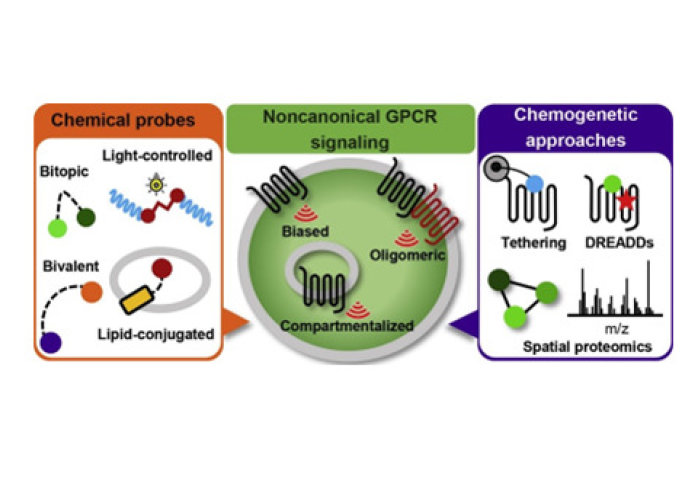Review article on G-protein coupled receptor signalling

Chemical biology approach to noncanonical G protein-coupled receptor signaling: toward advanced therapeutics
Congratulations to Dr Maria (Masha) Shchepinova who has recently published a review in Current Opinion in Chemical biology together with Dr Aylin Hanyaloglu and Prof. Gary Frost (Faculty of Medicine, Imperial College London).
G protein-coupled receptors (GPCRs) are membrane proteins that sense a variety of small molecules on one side of the membrane and transmit an array of signaling cascades on another side. They are involved in mediating a plethora of physiological responses like vision, appetite regulation, and neurotransmission.
GPCRs are the target of more than 30% of the drugs on the market. Recently, it has become evident that in addition to canonical GPCR signaling (involving extracellular ligand binding, conformational transformation, G protein-coupled signalling cascade), additional aspects of GPCR biology have come to light, including biased signaling (preferential activation of one pathway over another among multiple available pathways including G protein-independent ones), signaling of GPCR oligomers, and signaling from intracellular compartments.
These new layers of functional selectivity (called noncanonical GPCR signaling) greatly expand opportunities for advanced therapeutic interventions, but the development of new chemical biology tools is absolutely required to improve our understanding of such regulation and pave the way for future drugs.
The review highlights the most notable examples of chemical biology tools and methods to study noncanonical GPCR signaling.
Article text (excluding photos or graphics) © Imperial College London.
Photos and graphics subject to third party copyright used with permission or © Imperial College London.
Reporter
Dr Ravi Singh
Department of Chemistry